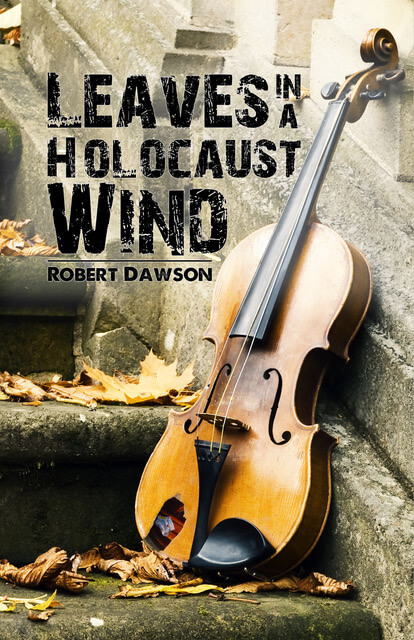NOT many 11-year-olds go looking for tramps and gypsies, and then invite them home for tea, but Derbyshire author Bob Dawson did just that in the 1950s!
Even fewer 14-year-olds get ‘evicted’ from school yet go on to become a primary school headteacher, but Bob had that experience too.
And the number of 17-year-olds who lived in a Romany caravan, but was not from a traveller community, must be few indeed.
There is no doubt that Bob Dawson, now well into his seventies, has packed a lot into his life… and has no intention of ‘retiring’, with his latest novel – Leaves in a Holocaust Wind – shortlisted for a prestigious award.
It’s a novel about the other community that suffered in the Holocaust: the Romani people, with an estimated one million-plus murdered in concentration camps.
For Bob, his interest in the traveller community goes back to his early days at the fee-paying Bradford Grammar School, where he had gained a place through a scholarship.
“All I wanted to be was a writer – but when they asked us at school what careers we wanted, the teacher said that being a writer wasn’t a real career, and put me down as a future librarian,” Bob said. “I then went looking for tramps, as I thought they might have their own language which I could write about.
“I invited them home for tea, and my mother was really kind about it, and sometimes gave them half-a-crown as well as tea, as presumably she thought I would soon grow out of it!
“They didn’t have their own language – although a lot of their language was very colourful! – so I then thought about gypsies, thinking they must have their own language, and sought them out too. It turned out they did have their own language, based on Sanskrit, but they didn’t think much of my invites for tea,” Bob added.

But his interest in the Romani people and their history had been well and truly stirred, as his hatred for school grew. “Along with some of my friends, I decided the school must go – and started digging at the foundations, hoping it would collapse the building,” he said.
And that’s why he and a few other 14-year-old classmates were, in Bob’s words, told to ‘get lost’ with just two GCEs to his name.
“I drifted about for a few years, gained another couple of GCEs, and then got a summer job with a local newspaper – the now-defunct Bingley Guardian – at the princely sum of £4 a week.”
He had a slightly longer stint at another Yorkshire newspaper, the Craven Herald, before a full-time reporter role at the Bradford Telegraph & Argus.
“I loved the work, became a qualified journalist and started to specialise in crime and court reporting.”
That experience undoubtedly helped Bob gain what was then the nation’s first job of its kind – a police press officer – with the West Yorkshire force at Wakefield; before moving to Derbyshire in 1971 as the press officer with this county’s police force.
But the job – going to the scenes of serious crimes and then sending out press release to local papers, radio and TV stations – took its toll. “I know I covered over 100 murders, but I never got hardened to the things I saw and reported on. I still have nightmares about it.”
Bob’s wife Janet could tell he was suffering and, after many discussions, he agreed to give teaching a try and, in 1977, started a course at Matlock Teacher Training College on primary school teaching.
After working at several Derbyshire schools, he eventually became head teacher of a primary school at Hodthorpe, near Worksop, before retiring through ill health.
It was in retirement that Bob took up writing – both books for a variety of publishers and articles for newspapers and magazines – and developing closer ties with the Romani communities in the region.
“I founded the North Derbyshire Gypsy Liaison Group, to try and help them to solve any problems that they had,” Bob said, “and I also continued to research Romani history in Britain.
“For example, I discovered about 20 ‘wayside burial’ sites in Derbyshire – places, usually on the grass verge of a road, where gypsies had been buried many years ago by their communities.
“Those communities often left little markers to show future generations where their ancestors were buried, but many of those have now disappeared,” he added.
Bob’s latest book, which is a finalist for The People’s Book Prize 2020, follows the journey to freedom of two young gypsies from their home in Slovakia during World War Two. One reviewer describes it as a ‘tale of lives torn apart but with the will to survive shining through’, while another said ‘Wow, what a page-turner! I was completely overcome by the raw drama that pulled and tugged me through this book.’
Bob, who lives at Blackwell, said he hoped the book would make more widely known the fact that “The same racist legislation used by the Germans to kill Jews was also applied to the Romanies. The most common word Romanies now use to describe the Holocaust is ‘Porrajmos’, which means ‘the devouring’, which seems very apt.”
Editor’s Note: Leaves in a Holocaust Wind is a paperback published by Austin Macauley Publishers, RRP £8.99, available from austinmacauley.com, Amazon and many book retailers (also available in Ebook at £3.50).

